您好,登錄后才能下訂單哦!
您好,登錄后才能下訂單哦!
這篇文章給大家介紹如何在Flutter中自定義Widget,內容非常詳細,感興趣的小伙伴們可以參考借鑒,希望對大家能有所幫助。
在Flutter實際開發中,大家可能會遇到flutter框架中提供的widget達不到我們想要的效果,這時就需要我們去自定義widget,從Flutter構建、布局、繪制三部曲中我們了解到,實際的測量、布局、繪制操作都在RenderObject中,我們是可以進行繼承相關的RenderObject來實現自定義的。但是其實flutter框架在設計之初就給我們預留出了自定義的入口,方便我們進行自定義。
CustomPaint自定義繪制
例:圓形進度條
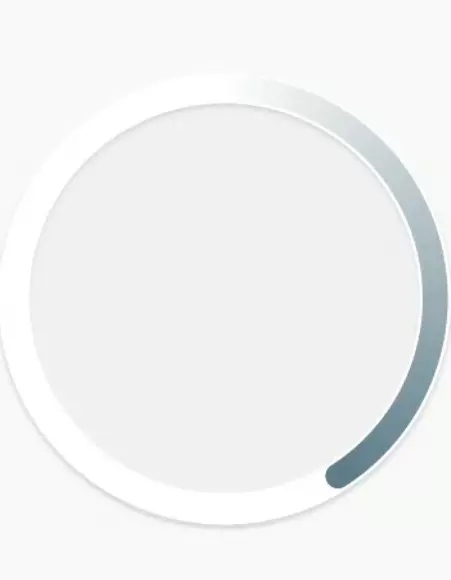
思路:使用CustomPaint繪制需要的效果
class CircleProgress extends StatelessWidget {
final Size size;
final double progress;
CircleProgress({@required this.size, @required this.progress});
@override
Widget build(BuildContext context) {
return CustomPaint(
size: size,
painter: CircleProgressPainter(endDegree: progress * 360),//在Painter中寫真正的繪畫邏輯
);
}
}
class CircleProgressPainter extends CustomPainter {
...省略
@override
void paint(Canvas canvas, Size size) {
...繪制的具體邏輯,size是畫布的大小
}
}CustomSingleChildLayout對單一child進行布局
例:實現對child約束成正方形
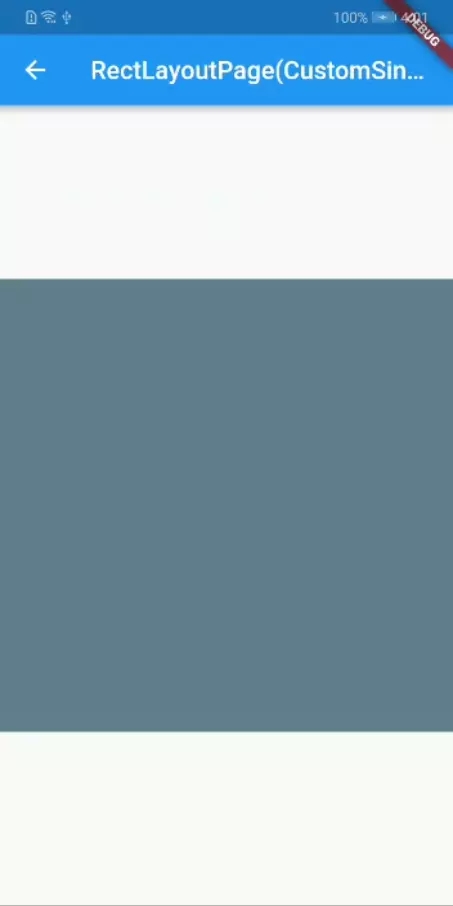
思路:使用CustomSingleChildLayout對child進行布局,并約束為正方形
class RectLayout extends StatelessWidget {
final Widget child;
RectLayout({@required this.child});
@override
Widget build(BuildContext context) {
return CustomSingleChildLayout(
delegate: RectLayoutDelegate(),//進行布局的代理
child: child,
);
}
}
class RectLayoutDelegate extends SingleChildLayoutDelegate {
//確定layout的size,constraints是parent傳過來的約束
@override
Size getSize(BoxConstraints constraints) => super.getSize(constraints);
///是否需要relayout
@override
bool shouldRelayout(SingleChildLayoutDelegate oldDelegate) => false;
///確定child的位置,返回一個相對于parent的偏移值,size是layout的大小,由getsize確定,childSize由getConstraintsForChild得出的Constraints對child進行約束,得到child自身的size
@override
Offset getPositionForChild(Size size, Size childSize) {
double dx = (size.width - childSize.width) / 2;
double dy = (size.height - childSize.height) / 2;
return Offset(dx, dy);
}
///確定child的約束,用于確定child的大小
@override
BoxConstraints getConstraintsForChild(BoxConstraints constraints) {//
double maxEdge = min(constraints.maxWidth, constraints.maxHeight);
return BoxConstraints(maxWidth: maxEdge, maxHeight: maxEdge);
}
}CustomSingleChildLayout對多個child進行布局
例:實現網格布局
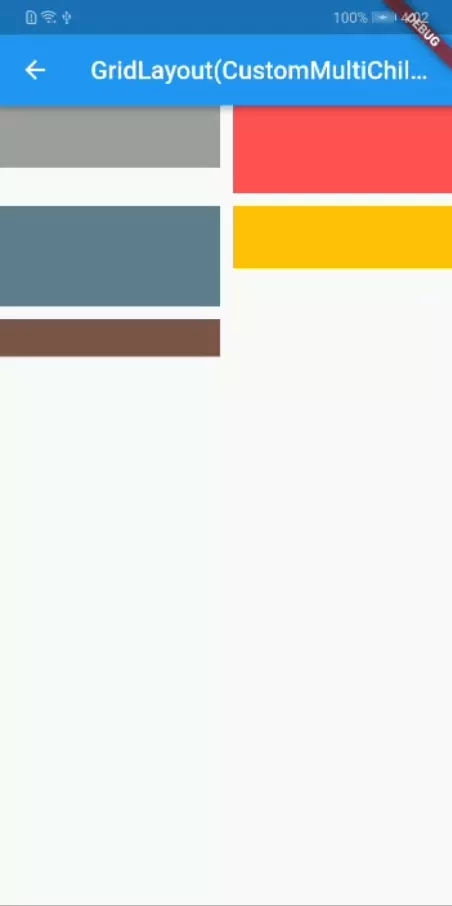
思路:使用CustomSingleChildLayout對child進行布局、定位,使其成為網格的布局
class GridLayout extends StatelessWidget {
final List<Widget> children;
final double horizontalSpace;
final double verticalSpace;
GridLayout(
{@required this.children,
@required this.horizontalSpace,
@required this.verticalSpace});
@override
Widget build(BuildContext context) {
List<Widget> layoutChildren = new List();
for (int index = 0; index < children.length; index++) {
layoutChildren.add(LayoutId(id: index, child: children[index]));
}
return CustomMultiChildLayout(
delegate: GridLayoutDelegate(//真正的布局實現
horizontalSpace: horizontalSpace,
verticalSpace: verticalSpace,
),
children: layoutChildren,
);
}
}
class GridLayoutDelegate extends MultiChildLayoutDelegate {
final double horizontalSpace;
final double verticalSpace;
List<Size> _itemSizes = List();
GridLayoutDelegate(
{@required this.horizontalSpace, @required this.verticalSpace});
@override
void performLayout(Size size) {
//對每個child進行逐一布局
int index = 0;
double width = (size.width - horizontalSpace) / 2;
var itemConstraints = BoxConstraints(
minWidth: width, maxWidth: width, maxHeight: size.height);
while (hasChild(index)) {
_itemSizes.add(layoutChild(index, itemConstraints));
index++;
}
//對每一個child逐一進行定位
index = 0;
double dx = 0;
double dy = 0;
while (hasChild(index)) {
positionChild(index, Offset(dx, dy));
dx = index % 2 == 0 ? width + horizontalSpace : 0;
if (index % 2 == 1) {
double maxHeight =
max(_itemSizes[index].height, _itemSizes[index - 1].height);
dy += maxHeight + verticalSpace;
}
index++;
}
}
@override
bool shouldRelayout(MultiChildLayoutDelegate oldDelegate) {
return oldDelegate != this;
}
//確定layout的size,constraints是parent傳過來的約束
@override
Size getSize(BoxConstraints constraints) => super.getSize(constraints);
}組合自定義
一般情況,組合自定義應該是我們最經常用的方式,通過繼承自StatelessWidget或StatefulWidget,把多個Widget組合起來,從而達到我們需要的效果。
例:下拉刷新,上拉加載
實現一:通過自帶的RefreshIndictor和ScrollController組合實現
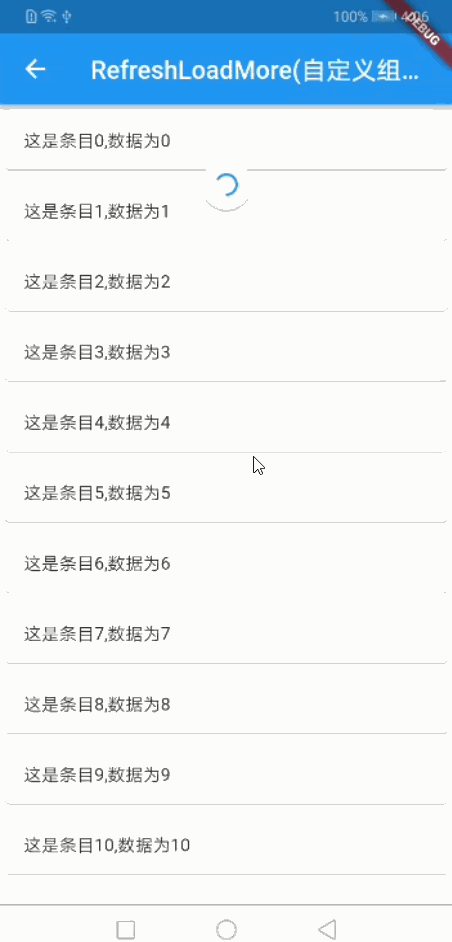
思路:通過對滾動進行監聽來觸發加載更多
_scrollController.addListener(() {
var maxScroll = _scrollController.position.maxScrollExtent;
if (_scrollController.offset >= maxScroll) {
if (widget.loadMoreStatus != LoadMoreStatus.noData) {
widget.onLoadMore();
}
}
});實現二:通過NotificationListener監聽scroll的整體狀態,讓后結合平移、動畫來實現
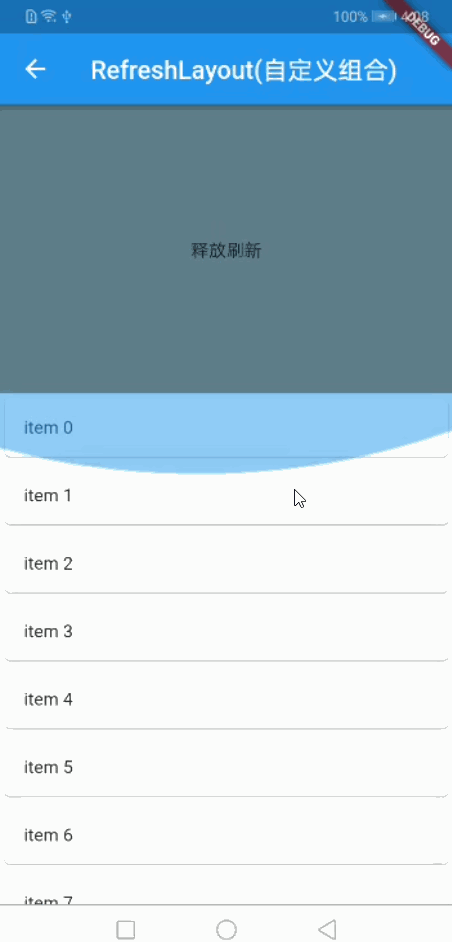
思路:通過監聽用戶overscroll的距離來平移內容區域,從而達到下拉刷新,上拉加載的效果
@override
Widget build(BuildContext context) {
double topHeight =
_pullDirection == PullDirection.DOWN ? _overScrollOffset.dy.abs() : 0;
double bottomHeight =
_pullDirection == PullDirection.UP ? _overScrollOffset.dy.abs() : 0;
return Stack(
children: <Widget>[
widget.headerBuilder.buildTip(_state, topHeight),
Align(
alignment: Alignment.bottomCenter,
child: widget.footerBuilder.buildTip(_state, bottomHeight),
),
Transform.translate(
offset: _overScrollOffset,
child: NotificationListener<ScrollNotification>(
onNotification: handleScrollNotification,
child: DecoratedBox(
decoration: BoxDecoration(color: Colors.grey[100]),
child: ListView.builder(
itemBuilder: buildItem,
itemCount: 30,
),
),
),
)
],
);
}例:上下左右滑動的layout
實現:通過GestureDetector監聽手勢滑動,然后通過平移來達到效果
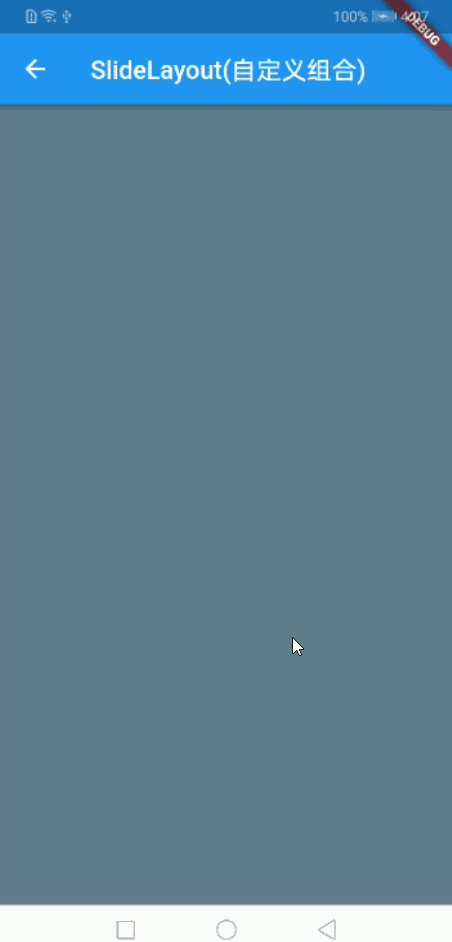
思路:主要處理滑動邊界,以及開關的零界點
@override
Widget build(BuildContext context) {
//debugPrint('_slideOffset:${_slideOffset.toString()}');
return GestureDetector(
onPanUpdate: handlePanUpdate,
onPanEnd: handlePanEnd,
child: Stack(
children: <Widget>[
widget.background,
Transform.translate(
child: widget.foreground,
offset: _slideOffset,
),
],
),
);
}關于如何在Flutter中自定義Widget就分享到這里了,希望以上內容可以對大家有一定的幫助,可以學到更多知識。如果覺得文章不錯,可以把它分享出去讓更多的人看到。
免責聲明:本站發布的內容(圖片、視頻和文字)以原創、轉載和分享為主,文章觀點不代表本網站立場,如果涉及侵權請聯系站長郵箱:is@yisu.com進行舉報,并提供相關證據,一經查實,將立刻刪除涉嫌侵權內容。